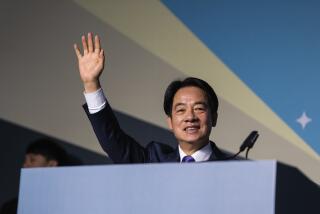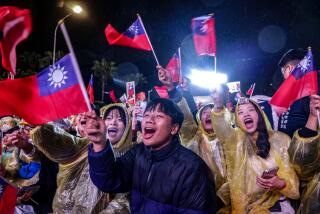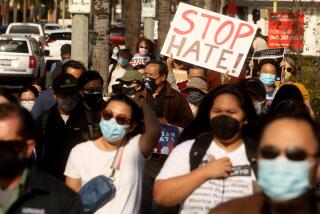Mme. Chiang’s Return to Taiwan Fuels Rumors of New Bid for Political Power
- Share via
TAIPEI, Taiwan — Shortly after the death in 1975 of Generalissimo Chiang Kai-shek, the political leader first of China and then of Taiwan, Chiang’s famed and powerful wife left Asia and went into seclusion in the United States.
Mme. Chiang Kai-shek, whose Chinese name is Soong May-ling, settled down on an estate in Long Island, N.Y. She left the affairs of Taiwan’s ruling Nationalist Party in the hands of Chiang Ching-kuo, her husband’s son from a previous marriage, with whom her relations were said to be cool at best.
Now, for the first time in more than a decade, Mme. Chiang has suddenly returned to Taiwan, touching off speculation here that she is attempting to play a role in choosing a successor to her stepson as president of Taiwan.
Her arrival--and her first public appearance, at a ceremony Friday commemorating what would have been the generalissimo’s 100th birthday--come at a particularly sensitive time.
Liberalization Moves
This fall, President Chiang, who is 76 and in frail health, has pushed the Nationalist Party to approve the lifting of martial law and the formation of new political parties. His efforts at political liberalization on Taiwan have aroused the opposition of older, more conservative members of the party, with whom Mme. Chiang has decades-old connections.
She flew into Taipei a week ago and was greeted at the airport by Taiwan’s political elite, from the president on down. Since then she has been meeting privately with family members and associates of the Chiang family who have gathered from around the world to celebrate Chiang Kai-shek’s birthday.
She has pointedly avoided announcing when, or whether, she will return to the United States.
“She probably will stay here for a while,” Ma Soo-lay, the secretary general of the Nationalist Party, who was among those meeting Mme. Chiang at the airport, told The Times in an interview.
Rally Draws 50,000
On Friday, Mme. Chiang appeared in public for the first time, delivering a short speech before a rally of 50,000 people honoring the memory of her late husband. She said she hopes the principle for which the Nationalist Party stands will “shine over the mainland once again.”
Her age is officially listed as 85, and by some accounts she is a few years older. Her voice is so low that the microphones at the rally had to be hurriedly turned up as she spoke. But the face that at one time graced the covers of American magazines seemed little changed and remarkably animated.
In a separate written message published Friday and entitled “Resurgam,” Latin for “I shall rise again,” Mme. Chiang said that “although living abroad during recent years, I have closely followed the domestic scene with joy and concern as if I were always on home soil.”
Family Played Crucial Role
For more than two decades after her 1927 marriage to Chiang Kai-shek, Mme. Chiang, an American-educated member of Shanghai’s wealthy Soong family, played a crucial role in governing China. Her connections with influential Americans such as Henry R. Luce, the late publisher of Time magazine, were important in obtaining U.S. support and financial aid for the Nationalist regime.
When the Communists took over China in 1949, the Chiangs and the Nationalists fled to Taiwan, pledging to return some day to the mainland. The government they established managed to stave off official American recognition of the Communist regime for three decades, until 1979.
One theory being advanced here for Mme. Chiang’s return is that she has simply decided she would like to spend her last days on Chinese soil. The Nationalist Party, like the Chinese Communist Party, considers Taiwan to be an integral part of China.
Others believe, however, that she is hoping to help select a new political heir for the Chiang dynasty.
Holds 2 Party Posts
Mme. Chiang still holds two positions within the Nationalist Party. She is the leading member of the Presidium of the party’s Central Advisory Commission, and she heads a special women’s group within the party. “She is well respected by the populace in general,” said Ma, the party secretary general, who is a close associate of the president.
One political analyst on Taiwan said he thinks it is possible that Mme. Chiang is seeking to line up support for the president’s son, Chiang Hsiao-wu, who is a trade official in Singapore.
“Gimo (Chiang Kai-shek) and the Madame brought Chiang Hsiao-wu up,” this analyst said. “There are countless pictures of the two of them tossing him as a child. To this day, Chiang Hsiao-wu is closer to her than to his own father and mother.”
Return Helps Old Guard
An opposition magazine editor, Antonio Chiang (no kin to the president’s family), said he believes Mme. Chiang’s presence will help conservative members of the ruling party who have been resisting the efforts to democratize political life on Taiwan. “Her return strengthens the Old Guard, and it’s not good for Taiwan,” he said.
In her written message, published in honor of Chiang Kai-shek’s birthday, Mme. Chiang said physical difficulties had kept her in the United States until now. “Incapacitated as I am by a fracture of the femur (the upper leg bone), I have just now returned to be with my countrymen and family members to witness the progress and prosperity of Taiwan, which is our base for national renaissance,” she said.
At Friday’s ceremonies, Mme. Chiang stood unaided at a podium to address the crowd. The president also attended the rally, but did not speak.
Chiang Kai-shek was born on Oct. 31, 1887. His 100th birthday was observed Friday because, as Chinese calculate a person’s age, the day of birth is regarded as the first birthday.
Taiwan newspapers reported that Mme. Chiang, the president and other members of the Chiang family joined Thursday to visit “the temporary resting place” southwest of Taipei where Chiang Kai-shek’s remains are to lie until the Nationalists recover the mainland.
Over the past two years, China’s ruling Communist Party has changed its official view of Chiang Kai-shek, giving him some limited credit for helping fight the Japanese during World War II. This revised view of history coincides with a continuing Communist campaign to persuade the Nationalists to begin talks aimed at reunifying Taiwan with the mainland.
More to Read
Sign up for Essential California
The most important California stories and recommendations in your inbox every morning.
You may occasionally receive promotional content from the Los Angeles Times.













